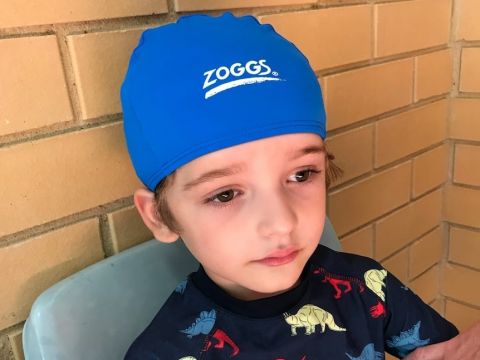
Families of children with autism spectrum disorder (ASD) are worried their kids will be missing out on vital water safety skills, with the National Disability Insurance Scheme refusing to fund one-on-one swimming lessons.
Key points:
- Until recently, the NDIS would fund the difference between standard and specialised swimming lessons
- Some parents have now been told they will only receive funding for group lessons
- Experts say the needs of children with autism mean group swimming is not the best way for them to learn
Scott Archer's family is one of them. His six-year-old son, Liam, loves the water — sometimes, a little too much.
"If he sees water, and it's 6 degrees outside, he wants to go in and makes every attempt to get into the water," Mr Archer said.
The family live in Tumbi Umbi on the New South Wales Central Coast, and tried traditional swimming lessons for Liam before moving to one-on-one lessons.
"We had some issues with the complexities that Liam presents with, and the ability for the swim instructors there to understand his needs and to be able to still do their job in a large environment where they might have five or six or more students in the pool with one or two teachers," Mr Archer said.
"There was some not great treatment from the swim instructors with their lack of understanding of disability and autism.
"And also with the reception and the stigma we got from some of the other parents there that really don't understand autism and sometimes see children with ASD as kids that have got bad behaviours or poor upbringings."
Clinical experts are arguing the NDIS had always operated on the premise that all children would need swimming lessons, and would not fund them entirely.
Erika Gleeson, chief executive of Autism Swim, said any policy to focus on group sessions overlooked the extra time and energy needed to handle the complex needs of students with autism.
"Children with autism are 160 times more likely to drown than their peers," she said.
"For many individuals with autism, they gravitate toward bodies of water, yet they often have a decreased ability to perceive risk and danger when they get there."
Liam Archer has been receiving one-on-one swimming lessons.(Supplied)
Ms Gleeson said that until a couple of months ago, the scheme would cover the difference in cost between specialised classes and standard swimming lessons.
But families started reporting they had been knocked back for support and were told they would only be funded for group sessions, rather than private classes.
Mr Archer fears some families may not be able to afford the extra cost of the specialised lessons.
Aside from that, leaving their children without vital water safety skills, he also feared what that may mean for the financial viability of specialty autism swimming schools.
"My perception of what I hear is … it's a privilege," he said.
"Some of the comments we get from [NDIS] planners are, you know, 'gee it'd be nice if someone paid for my swim lessons' or things like that."
"It's a bit disparaging, the comments that we face, that it seems discriminative that we're asking for something that is above and beyond, or that it's such a luxury to some extent."
Erika Gleeson started Autism Swim to tailor swimming lessons to kids on the autism spectrum.(Supplied: Autism Swim/High Exposure)
Ms Gleeson and Mr Archer both noted specialised autism swimming sessions went beyond traditional lesson structures.
"Initially, we have to teach the fundamental safety skills and have them feeling relaxed and benefiting from the therapeutic benefits of the water before we launch into any sort of functional swim stroke or anything like that," Ms Gleeson said.
"We have many participants that have seizure activity, for instance — so need one-on-one supervision at all times.
"We have other individuals whose needs are such that they may go under the water because it's their happy place, and it's where their sensory needs are being met — but they don't actually know to come back up and take a breath, and are reliant on others to facilitate that for a period of time.
"That's not to say that, for many of them, the medium to long term goal would be for them to move into a small group lesson, but that would need to happen over a period of time and very systematically, based on the milestones that they're meeting."
When Elly was 27, she had to work out each day which medical bills she could afford. Now life is totally different
NDIA insists no change to funding rules
The National Disability Insurance Agency, which manages the NDIS, insisted there had been no change in its funding rules, despite the experience of Autism Swim and families across the country.
"The NDIA continues to provide disability-related funding to eligible Australians to support them with daily tasks, participate in their community and live a normal life," the agency said in a statement.
"This may result in a support worker supporting children as part of activities such as swimming lessons.
"This helps support participants to have the opportunity to be included in a group setting, not excluded."
The NDIA said it would consider requests for additional support on a case by case basis.
"However it would be anticipated that, if approved, this funding would be on an interim basis, with the ultimate aim for the child to progress to a group setting," the agency said.
Posted 15 Oct 2021